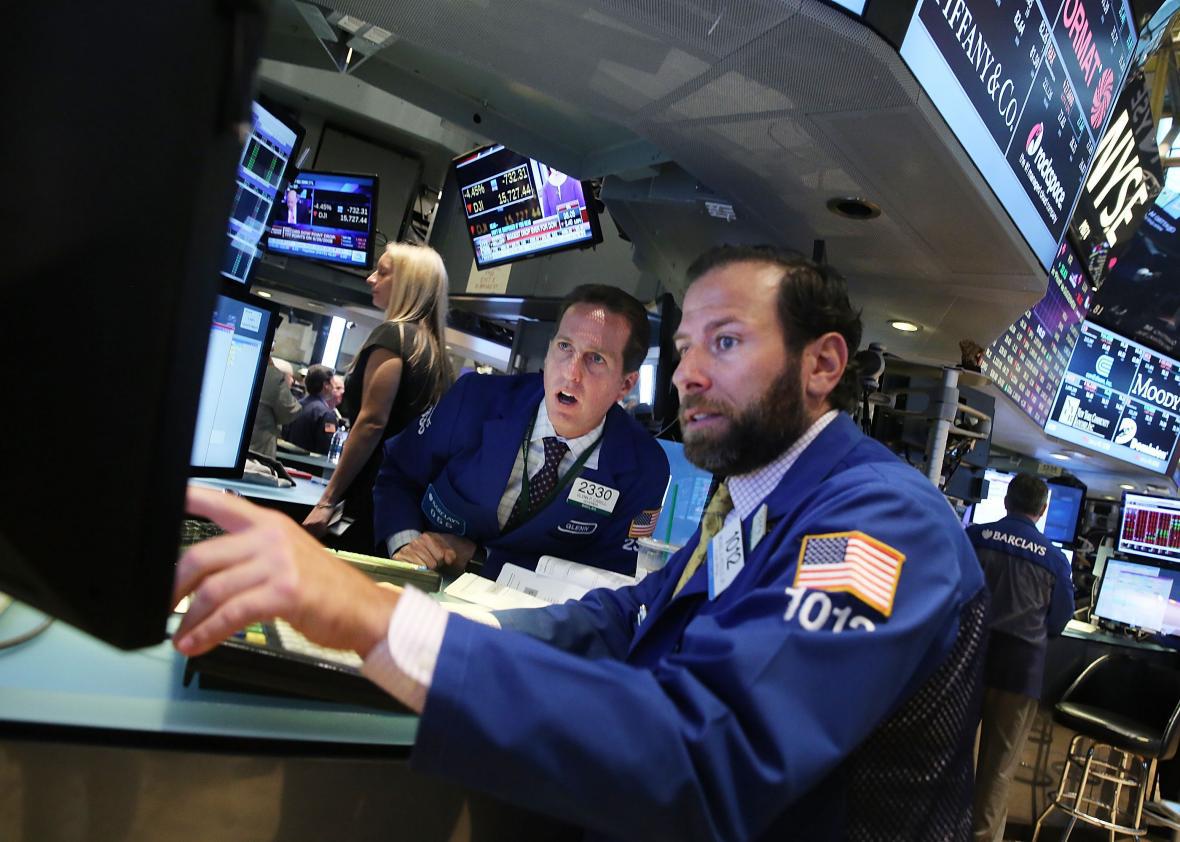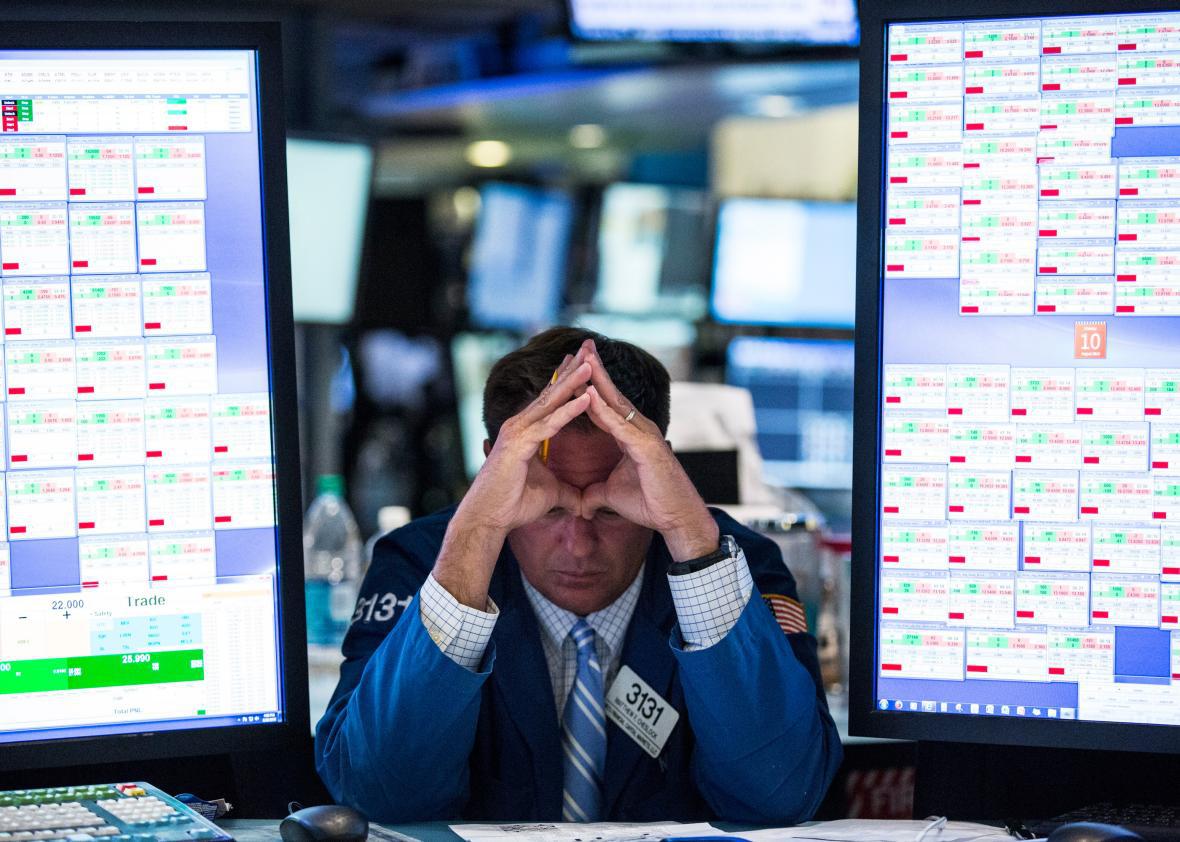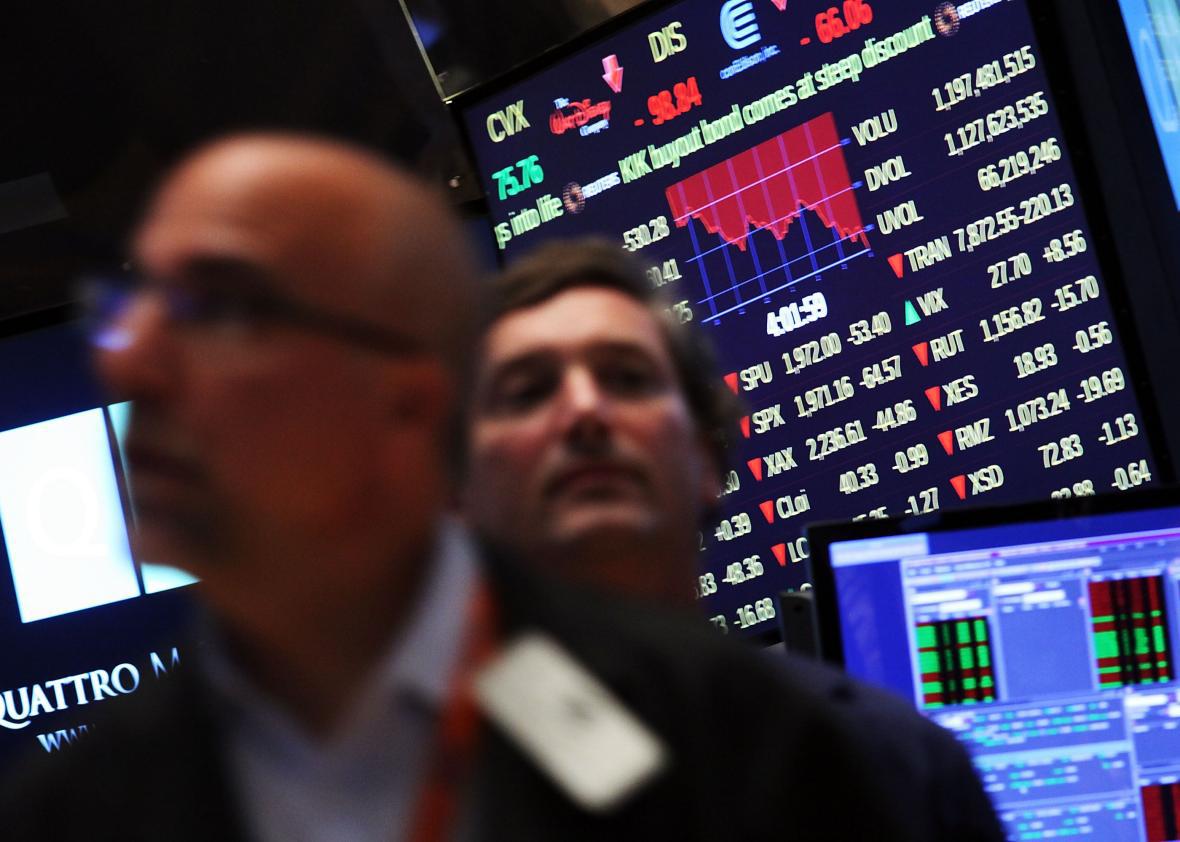Let’s get started. Give me the latest.
Happy Tuesday! Stocks in China sold off again overnight. Elsewhere, things look to be stabilizing. European shares opened higher. U.S. futures are pointing sharply up.
Whoa, slow down. I still hear Jim Cramer yelling and feel vague pangs of doom. What the hell is happening?
A lot! Stock markets have been in tumult all around the world since last week. But Monday was especially violent—think barrels tumbling off Niagara Falls. It was bad in China, in London, in Japan. Here in the States, the S&P 500 dove about 4 percent, with the Dow and the Nasdaq taking similar spills. Over the past five days, the benchmark S&P index has lost more than 200 points, or about 9.7 percent, putting it on track for the worst August in 17 years.
So far on Tuesday, shares in Shanghai closed down another 7.6 percent. They’ve now toppled more than 15 percent over the past two days alone. This, despite the fact that China’s central bank injected 150 billion yuan (about $23.4 billion) into the financial system. Analysts have started describing that market with adjectives like “self-imploding.” Exciting stuff!
Donald Trump says this is all China’s fault. Is it China’s fault?
Kind of, though it’d be a gross oversimplification to pin this all on China. But financial, economic, and monetary worries in the Middle Kingdom are definitely spooking U.S. investors.
So what exactly did China do?
The shortish version is that this all started two weeks ago when China decided to devalue its currency. For two straight days, China’s central bank allowed the yuan to fall by nearly 2 percent, then keep edging down. This caught a lot of people off guard. China has kept a tight grip on its currency exchange rate for 20-some years. Since March, the yuan hadn’t moved more than 0.3 percent in a single day. For it to suddenly plunge 4.4 percent in a matter of days sent shivers through the global markets.
On top of that, we’ve also seen a lot of scary economic data come out of China over the past two weeks. Exports, a traditional mainstay of the Chinese economy, slumped a worse-than-expected 8.3 percent in July. (One theory for why the People’s Bank of China let the yuan slide was to prop up exports.) In August, China’s factory sector shrank faster than it had in six years. Sales of smartphones in China during the second quarter fell year over year for the first time ever. By official tallies, China’s economy is growing at a rate of 7 percent. But based on everything else we know, that’s looking less and less like reality.
That was the short version? That wasn’t short!
OK, fair. But it was shorter than the longer version.
Uh, do I need the longer version?
Well, here it is in a nutshell. Basically, people knew that China’s economy was slowing, but they didn’t know by how much. Everything that’s happened recently—the currency devaluation, the spate of poor economic data, the generally baffling response from Beijing—has only served to increase two fears. One, that China’s economy is in much worse shape than anyone realized. Two, that Chinese policymakers don’t actually have some grand master plan for the economy that explains the ups and downs of the past few weeks—that they might just be winging it.
Both of these scenarios are terrifying to investors worldwide because of the outsize role that China plays in the global economy. China is second only to the U.S. in terms of gross domestic product. And in recent years, China has accounted for up to half of global growth, though it makes up just 15 percent of global output. But core segments of the Chinese economy are sputtering, like consumer spending, construction, and financial services. Some economists fear certain provinces and regions could be facing outright recessions. Once China’s slowdown gets big enough, it doesn’t happen in isolation—it drags the rest of the world along.

Photo by Spencer Platt/Getty Images
OK, that’s China. But someone on CNBC is mumbling about the Federal Reserve. Should I be pissed at Janet Yellen?
Janet Yellen is a delightful, brilliant woman, and you should harbor no ill will toward her.
But yes, some of this might be the Federal Reserve’s doing. For a while now, the central bank has been signaling its intention to hike interest rates, which has people scared for a couple of reasons. Higher interest rates make borrowing more expensive, which is generally bad for corporate profits and stocks prices. They also make the dollar more valuable, since they reduce the chances of inflation, and attract more foreign investment into things like Treasurys and U.S. corporate bonds.
The dollar has already been on a tear, and it could be a problem for the rest of the world if it goes higher, since it will become harder for international companies that borrowed in dollars to pay off their debts. On the flip side, a pricier greenback makes it tougher for U.S. companies to sell their stuff abroad. Which is why some people are wondering whether all the tumult we’ve seen might well convince the Fed to hold off on its increase for a bit.
Wait, let’s back up. What’s a stock market?
Don’t be cute, you know what a stock market is.
That said, I’m guessing you might have heard a few finance types talking about “equities” markets as well. “Equities” is just a fancy word for “stocks.” Don’t let the talking heads on TV confuse you.
OK. Those talking heads keep mentioning “a correction.” What’s that all about?
A correction is just the shorthand stock analysts use to describe when the market falls 10 percent below its recent highs. We’re just about there right now. Thankfully, Jonathan Franzen is in no way involved.
Phew. That guy’s a jerk. So should I sell my stocks and finally make use of that doomsday shelter I’ve been prepping?
The natural reaction in moments like these is to panic. But please resist the urge. Unless you desperately need the money in short order and can’t risk the market falling any further, it’s generally best not to sell stocks after a big drop. And if you do desperately need the money in short order, you probably shouldn’t have had it in stocks to begin with. When you need dollars on command, cash is king.
Should I buy some stocks, then?
Maybe? Obviously, it’s a good idea to buy low and sell high. And, typically, stocks bounce back after the S&P 500 falls by more than 5 percent in a week. But sometimes they don’t. A solid rule of thumb: If you were planning to invest some money anyway, and won’t need it for a long while, then now is as good a time as any to put money in the market. You’re certainly better off buying today than you were two weeks ago.
On another note, if you’re the sort of person who actively manages your retirement portfolio (in which case you’ve probably skipped over this section), it might be time to do a little rebalancing.

Photo by Andrew Burton/Getty Images
Is the American economy screwed?
Not really, or at least not yet.
First, keep in mind that stock prices aren’t the best measure of the economy’s overall health. Remember how crappy the U.S. recovery felt back in 2010? Well, shares were surging then. And while a bull market might slightly benefit the economy as a whole through a modest “wealth effect”—meaning that when portfolios rise in value, people feel richer and spend more—most families simply don’t own that much stock. In 2013, the bottom 90 percent of U.S. households laid claim to less than 20 percent of all shares, according to New York University economist Edward Wolff.* The fraction is even tinier if you exclude hard-to-access retirement accounts like 401(k)s. So, in a sense, when the market crashes, it’s mostly a problem for the rich.
Of course, there are some real economic troubles shaping up abroad that could hurt American businesses. Companies that sell lots of goods in China, like Apple and General Motors, could be in for a rough patch, for instance. But thankfully, the U.S. as a whole is a little bit insulated from the world’s troubles, because so much of our growth is driven by how Americans spend here at home, rather than by exports. In fact, the relative strength of the U.S. economy is part of the problem here. If the job market were weaker, the Federal Reserve wouldn’t seriously be contemplating an interest rate hike in the near future, which as we noted is one of the issues that people think is driving the market downturn.
There might also be an upside for middle-class families in all this: cheaper gas. With demand slumping in the rest of the world, the price of U.S. oil has fallen below $40 a barrel, which is quite cheap. Of course, this isn’t great for rig workers in the Texas or North Dakota. But drivers should be able to fill up their tanks for a song this autumn.
That said, there is some case for pessimism. America does export quite a bit. And if the rest of the world were to plunge into a serious recession, we’d probably start to feel some of the pain. And again, if the dollar’s value keeps rising, it will become ever harder for our businesses to sell smartphones, Chevys, and beef abroad, while making foreign profits that have to be converted into dollars less valuable. So there could be some trouble ahead. And given that the outlook for U.S. growth is fairly weak already, we don’t have a huge buffer to rely on.
I’m still gripped by a nebulous sense of dread. Is there any way this could turn into a financial crisis like 2008?
It’s highly unlikely.
While everyday investors care a lot about stocks, share prices aren’t really essential to the health of the world’s financial system. By contrast, securities backed by American mortgages, which really had become the lifeblood of global finance, turned toxic in 2007 and 2008, which led investors to panic. It all came to a head with the collapse of Lehman Brothers, which sent the market into paroxysms because a) Lehman was a very large investment bank that owed lots of people money and b) nobody knew whether the U.S. would allow other major financial institutions to fail. Right now, it’s really hard to envision a similar chain of events. Meanwhile, Bloomberg seemed to float the idea that by devaluing the yuan, China could set off a currency war with consequences similar to the emerging market crisis of the 1990s. But it also didn’t find a single expert who thought that was realistic.
You seem awfully relaxed about all this. Should I just completely tune all this market news out? Why does any of this matter to my life?
We should all strive to be informed global citizens. Also, in the unlikely event that the entire world really does collapse into a financial crisis, you won’t have to waste time catching up on the action.
*Correction, Aug. 25, 2015: This post originally misspelled Edward Wolff’s last name.
